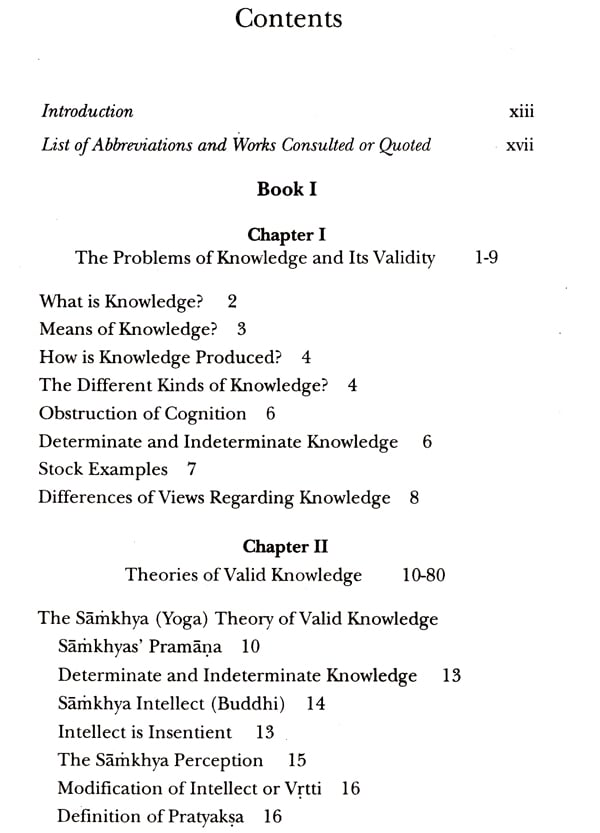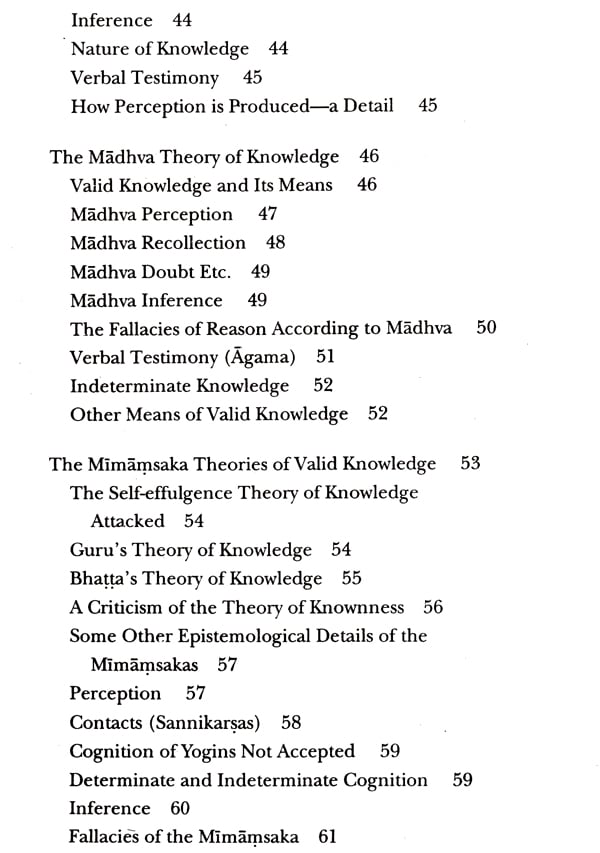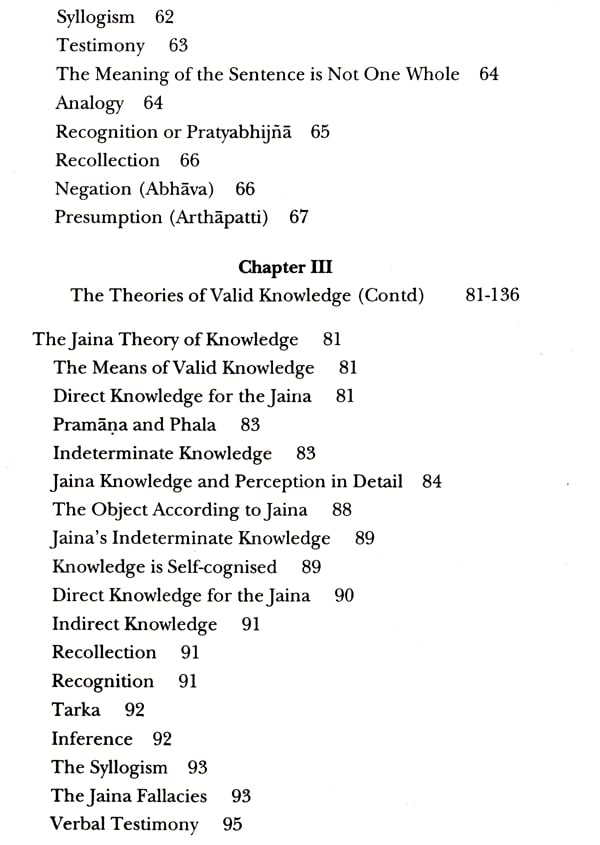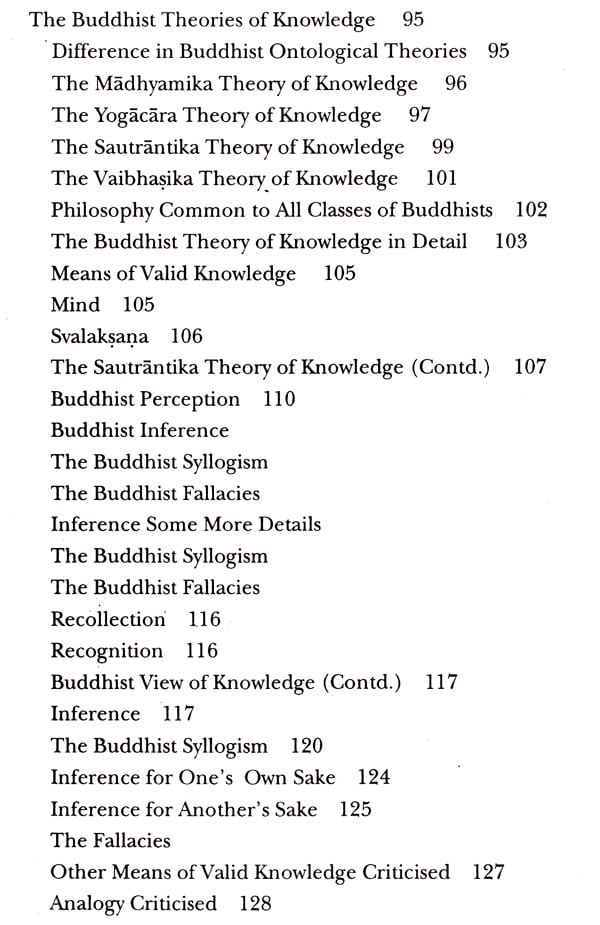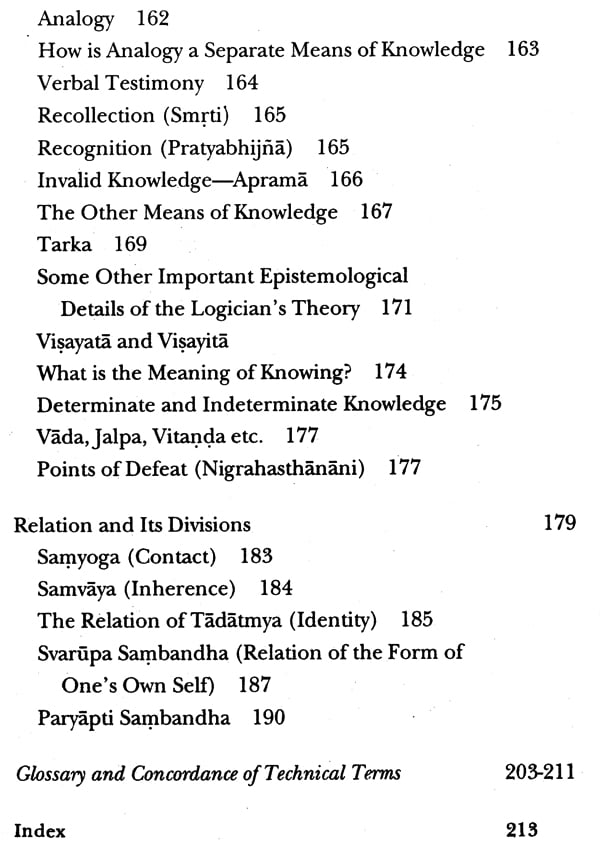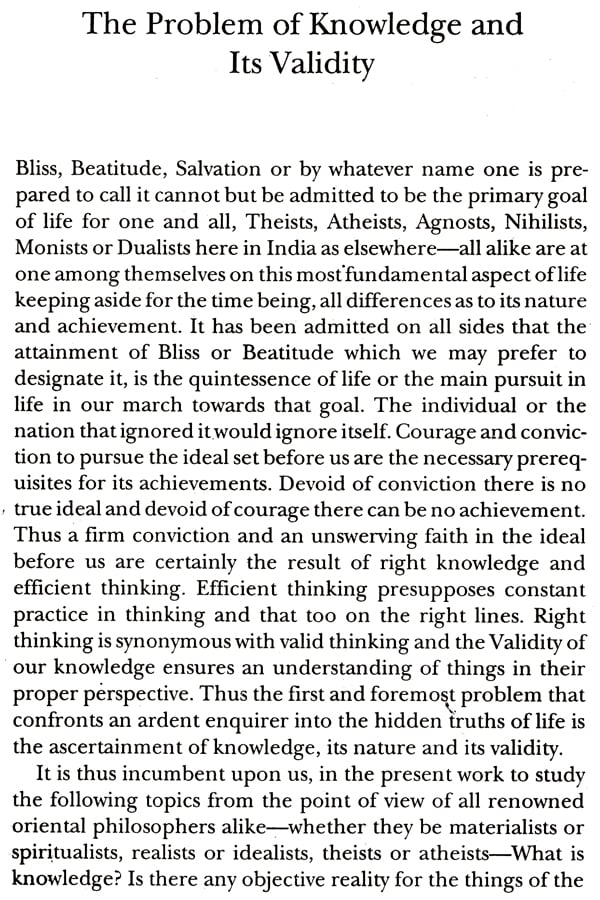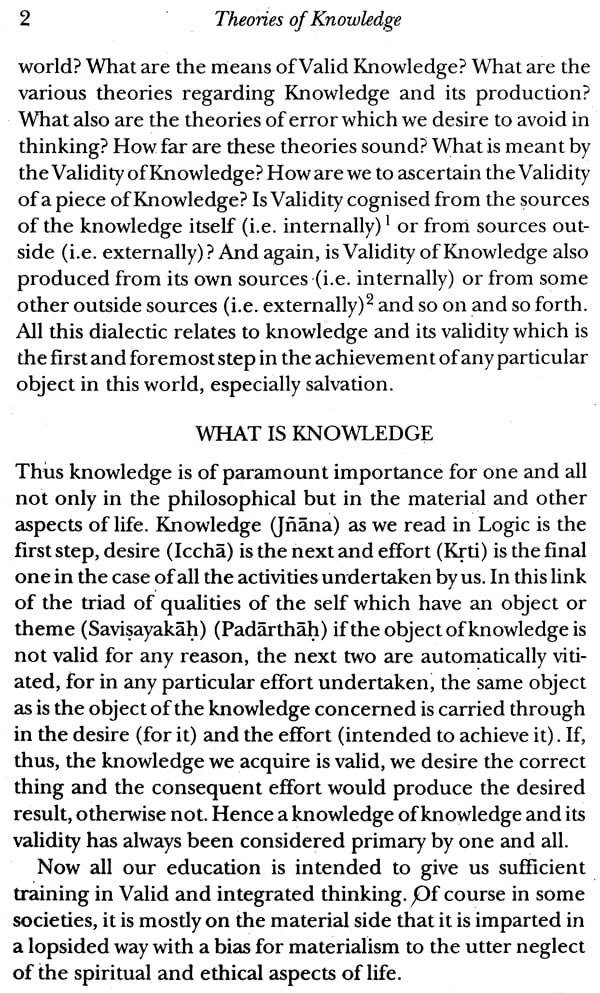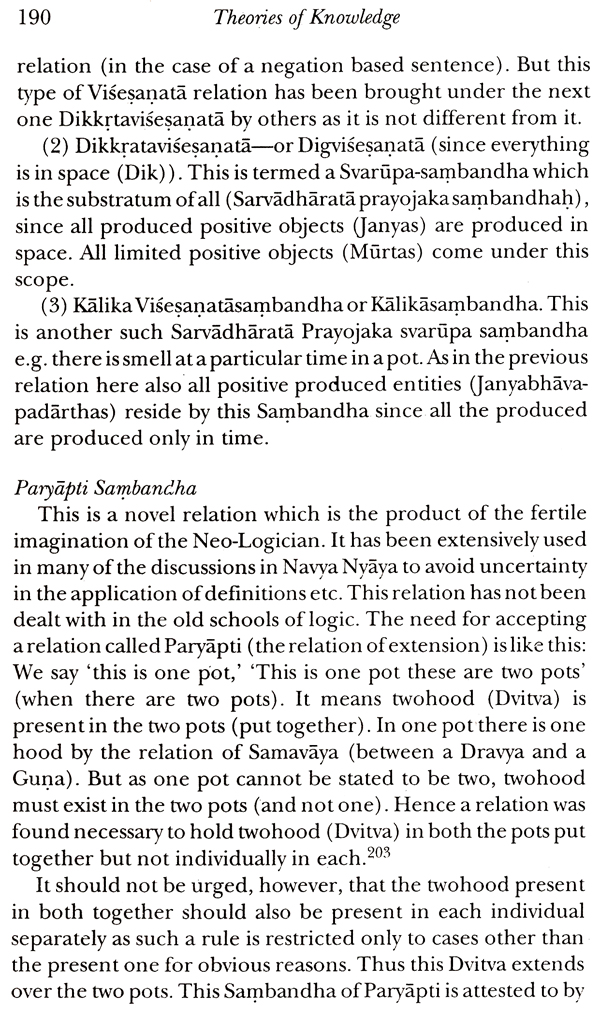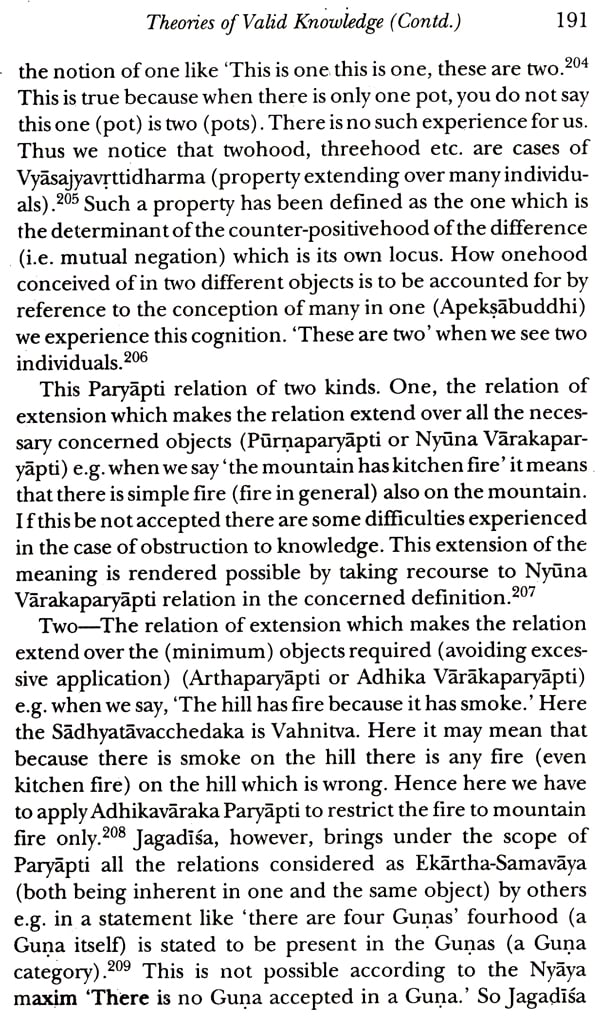
Theories of Knowledge- Its Validity and Its Sources (An Old Book)
Book Specification
| Item Code: | NAS581 |
| Author: | Veluri Subba Rao |
| Publisher: | Sri Satguru Publications |
| Language: | English |
| Edition: | 1998 |
| ISBN: | 8170305721 |
| Pages: | 260 |
| Cover: | HARDCOVER |
| Other Details | 9.00 X 5.50 inch |
| Weight | 400 gm |
Book Description
The present book deals with dialectics of knowledge, the theory of valid and invalid knowledge and its source in all its aspects. The present book is divided into four chapters. They deals with the problems of knowledge and its validity; Theories of valid knowledge according to the Sankhya, the Vedantins, the Visistadvaita, the Madhya, the Mimamsaka, the Jaina, the Buddhists, and the Logicians's theory of knowledge. A Glossary and concordance of technical terms and an index is included in the book.
Prof. Veluri Subba Rao was professor & head Department of Sanskrit, Andhra University. He has to his credit numbers of articles and books.
During my ramblings in the field of search for truth even in the early part of my juvenile speculations, it struck me that the first and foremost step leading to a knowledge of truth about the universe was only a study of knowledge and its validity. Unless one was quite sure of what knowledge was true or valid, one would run the risk not only of wrongly philosophising on important issues of life and after-life but also, of incorrectly interpreting the validity or invalidity of statements made by others. The number of the means of valid knowledge, their nature, the way in which they are capable of producing knowledge, the way in which invalid knowledge takes possession of persons and kindred topics are of utmost consequence in the establishment of the truth of anything, and as such the importance of Epistemology cannot be minimised in any aspect of the search for truth.
But to my utter surprise, after a few years of schooling in Logic under ancient Sanskrit scholars, I was given to under-stand that the piercing intellect of the ancient Indian Sanskrit savants had already dived deep into this abstruse science of knowledge and its validity.
This reminds me of a funny anecdote narrated to me in my early childhood that a certain great explorer after a strenuous effort had reached the North Pole and was on the point of hoisting his national flag in token of his first exploration of the pole, when, suddenly, to his great surprise, a certain, caterer emerged from a small but in the vicinity and enquired whether he would like to have a cup of coffee. What I mean to say is that the philosophical speculations of the ancient and mediaeval Hindu prodigies of learning, both theistic and atheistic, soared to great heights and not a single subject of pith and importance could miss their attention.
A study of this branch of philosophy of the validity of knowledge was occasioned in our Sastras when the validity of the Veda was considered infallible by the Hindu. The heratic, on the other hand, contested the fact. The orthodox Hindus including ritualists as well as others bombarded the skeptics with vehement arguments. For the ritualist the Veda is a source of Valid Knowledge as validity of knowledge is always established from internal causes (of the knowledge itself) and no external cause is necessary for it, though in the case of invalidity, it is otherwise. The Logician, on the other hand, admits that knowledge derived from scriptural sources is surely valid as it is conceived by an omniscient whose is always a reliable statement. But to him knowledge derives its validity from external sources. The statement of the scriptures in his opinion, is valid inasmuch as it is the statement made by the omniscient and knowledge derived from Vedic sentences is thus valid for him.
The seeds of this branch of learning were sown in the early philosophical speculations; they sprouted up in the later Hindu Sastras of the Sutra period and became full-fledged with all their ramifications of a dialectical nature in almost all systems of philosophy-Sainkhya, Mimarnsa, Tarka and Vedanta, besides the skeptic schools of Buddhism and Jainism.
The enquiries that have been undertaken in this regard in the learned scholia of the Logicians and the Mimainsakas of the time from Kumarila down to the Modern Logician of the Nauclea School and the highly dialectical and polemical nature of these treatises with all their logical niceties and brain-fagging subtleties have made this science of knowledge unapproachable to the average modern research scholar. I am very well aware of the depths of the subject and the subtleties of Logic both in the ontological and the epistemological spheres which are a desideratum to attempt a study of this subject on the one hand, to understand the hair-splitting details of the science and, on the other, to present them in a manner intelligible to the average reader. Nevertheless, I have made bold to undertake an examination of knowledge and its validity partly because of the interest that it has created in me during recent years and partly because of the fact that it has not so far been individually and copiously attempted by research scholars.
I may also point out that the purpose of the present work is to enter into the dialectics of knowledge, the theory of valid and invalid knowledge and its source in all its aspects but eschewing the rather doubtful details of chronology of the philosophers concerned as their theories were developed over centuries of deliberation. But at the same time, I request my readers not to presume that all that has been discussed in detail in those works has been presented here but to treat this as a Manual of Epistemology which has no pretences to a great amount of originality except that, herein, for the first time in the history of research in India, this subject has been individually taken up, facts collected, arranged and criticised in considerable detail with the original opinions of the author also appended at length in the chapters on Critiques of Knowledge and Validity.
The subject here has been dealt with from the point of view of the leading philosophical thought extant in India. Topics like 'What is knowledge? What is Validity of knowledge? How is it established from internal or external sources?' etc. have all been answered in the present study with marginal headings according to all the popular schools of philosophy-Sarilkhya, Mimarnsa, Tarka,Vedantas, Buddhism and Jainism. Book One deals with the theories of knowledge valid and invalid, Book Two a critique and Book Three with the definitions of validity and the sources from which validity is produced and cognised.
I have tried to discuss most of the details about knowledge and its varieties in full under the logicians' theory of knowledge. However the reader is referred to the critiques herein if he desires to compare the views of one theorist with those of another. A comprehensive critique of knowledge and another on its validity discuss almost all important epistemological details at length.
**Contents and Sample Pages**
